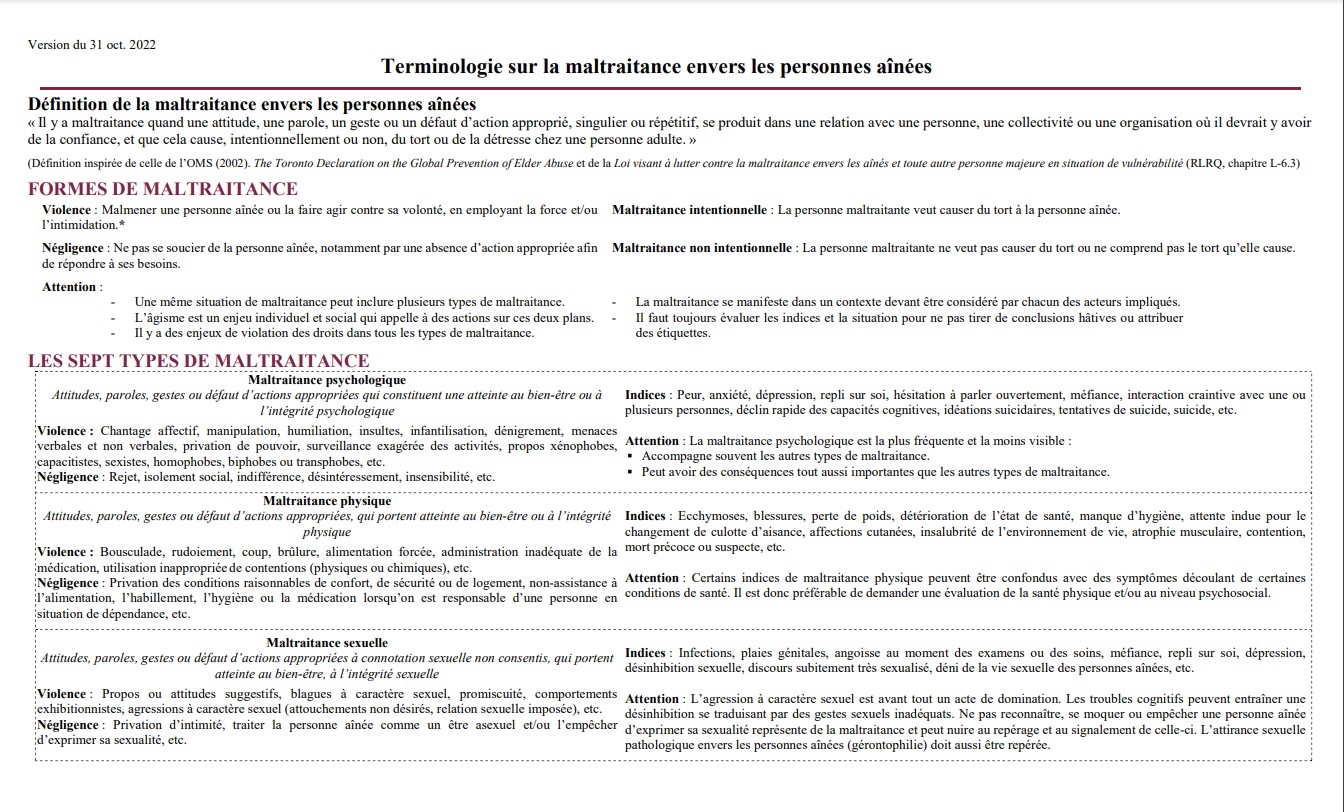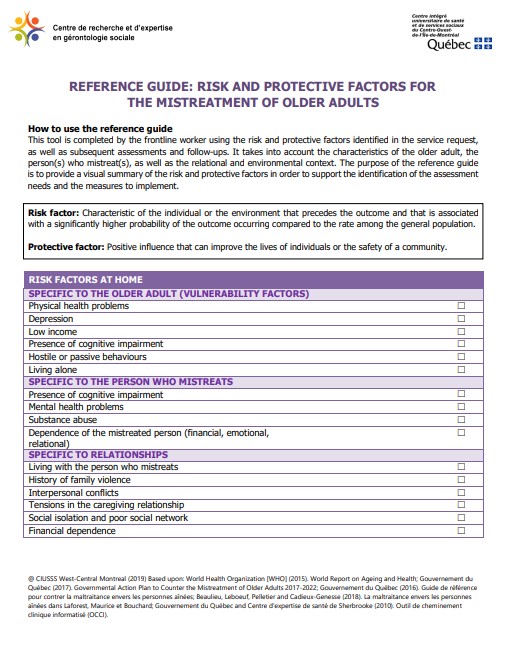Domain of Expertise
to Counter Mistreatment of Older Adults
RSSS Resources
ORGANIZATIONAL AND CLINICAL TOOLS
Other useful tools
- Outil de repérage des situations de maltraitance envers les personnes aînées
- Guide pratique pour l’industrie des services financiers : Maltraitance financière: Protéger un client en situation de vulnérabilité
- Guide pratique pour appliquer la démarche de mise en valeur des pratiques de bientraitance « ordinaire » en CHSLD, RI et RPA au Québec : un travail de mobilisation de tous les acteurs concernés
- Guide de référence pour contrer la maltraitance
TRAINING
Training sessions to counter mistreatment of older adults aimed at RSSS personnel, available on the site of the Environnement numérique d’apprentissage (ENA) provincial de la Formation continue partagée (FCP).
- Countering the Mistreatment of Older Adults – Introduction
- (Find the French version here) Introduction à la lutte contre la maltraitance envers les personnes aînées et toute autre personne majeure en situation de vulnérabilité
- Identification and Reporting of a Situation of Mistreatment Toward an Older Adult
- (Find the French version here) Identification et signalement d’une situation de maltraitance envers une personne aînée ou toute autre personne majeure en situation de vulnérabilité
- Intervention psychosociale dans la lutte contre la maltraitance envers les personnes aînées et toute personne adulte en situation de vulnérabilité
- Prévention et gestion de la maltraitance envers les résidents et résidentes en CHSLD
These training courses were developed by the Domain of Expertise as part of a ministerial mandate granted to the CIUSSS West-Central Montreal by virtue of its designation as a University-Affiliated Centre (UAC) in social gerontology.
CLINICAL RESSOURCES
Elder Mistreatment Helpline (LAAA)
The Elder Mistreatment Helpline (LAAA) is a listening and referral phone line specializing in older adults’ mistreatment. It offers services to various types of clienteles and is aimed specifically to older adults in situations of mistreatment, their families and friends, as well as anyone (general public, health and community service providers, professionals) who is concerned about an older adult who seems to be in a situation of mistreatment.
This telephone line was developed and implemented through a collaboration between the SAPA Directorate and CREGÉS as part of a mandate granted by the MSSS to the CIUSSS West-Central Montreal (formerly the CSSS Cavendish).
Phone: 1-888-489-2287
Website: https://www.aideabusaines.ca/
Provincial Multisectoral Consultation Team to Counter the Mistreatment of Older Adults
The management of mistreatment situations requires the combination of medical/functional, psychosocial, financial and legal expertise. The CIUSSS West-Central’s provincial Multisectoral Consultation Team was created in 1992. This service was developed to support the intervention team dedicated to situations of mistreatment and to complement the training offered to workers in the health and social services network, who were confronted with complex situations or issues of older adult mistreatment, requiring the involvement of several areas of expertise and intervention sectors. Since 2019, the Team refocused its service offering on complex cases from the RSSS, the community network, the financial sector and the legal sector. It works in complementarity with the processus d’intervention concertés (PIC).
Clinical consultation to counter mistreatment of older adults for practitioners of the CIUSSS West-Central Montreal.
These meetings offered to practitioners of the CIUSSS West-Central Montreal include: 1) Clinical consultations facilitated by the Coordinator of CREGES’ Domain of Expertise to Counter Mistreatment of Older Adults; 2) Psychosocial strategies and interdisciplinary and/or multisectoral interventions; 3) Information and assistance to practitioners on identifying, accessing and using appropriate resources (legal, public, health and social services, community, etc.); 4) Information on the responsibilities of practitioners and the limits of their interventions.











